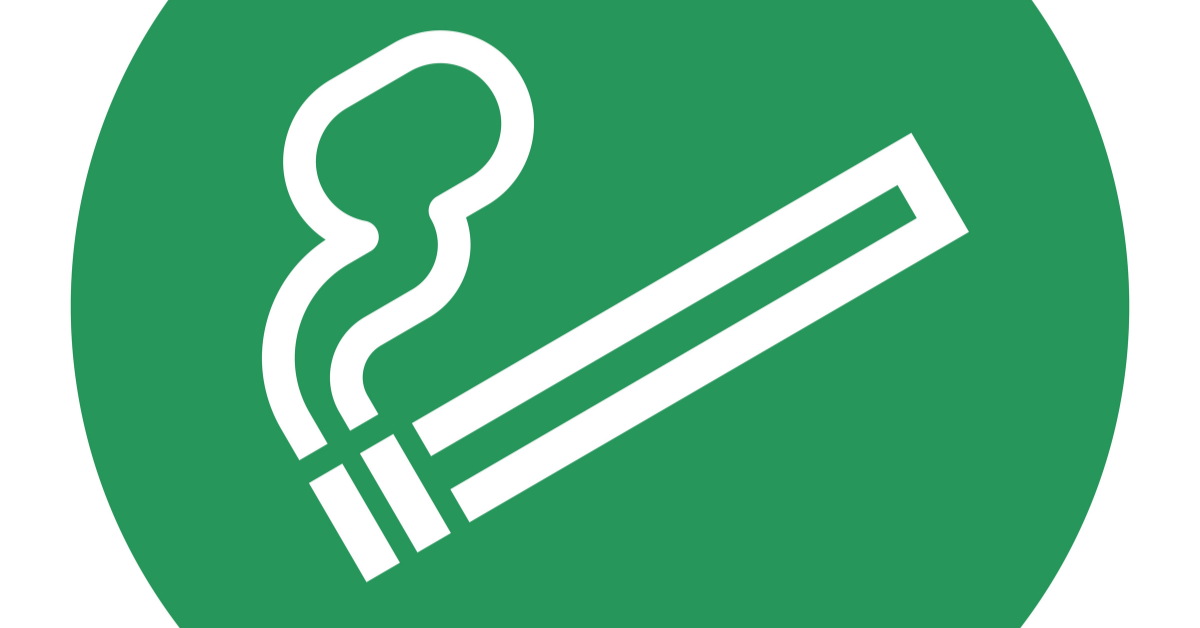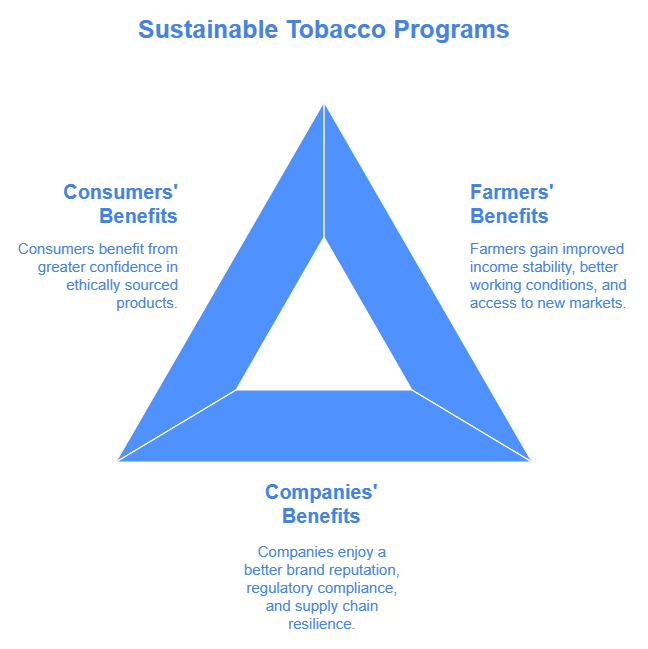Contact: +91 99725 24322 |
Menu
Menu
Quick summary: Discover how sustainable tobacco programs redefine ethical sourcing by addressing labor rights, environmental impact, and supply chain transparency. Learn why this shift is crucial for the industry's future.

In recent years, the tobacco industry has come under scrutiny for its environmental and social impact. Unsustainable sourcing practices, such as deforestation and poor labor conditions, are not only harmful to the environment and communities but also pose significant risks to businesses as consumers demand more ethically sourced products. With growing awareness of these issues, tobacco companies face an urgent need to transform their supply chains. But how can they navigate these challenges while maintaining profitability? Sustainable tobacco program is emerging as one of the solutions.
The Sustainable Tobacco Initiative promotes excellence in farming methods, environmental stewardship, and essential social and human rights issues.
These initiatives promise to address the pressing concerns of ethical sourcing, offering a way to improve transparency, promote fair labor practices, and reduce environmental harm. By embracing sustainability, tobacco companies can ensure long-term business viability while meeting the demands of a more conscious consumer base. It’s clear: the future of ethical sourcing in the tobacco industry depends on sustainable practices.
Key Takeaways
Traditional tobacco sourcing practices have long been criticized for their negative impact on people and the environment.
These challenges raise a critical question: how can tobacco companies secure sustainable practices while maintaining profitability and transparency?
Sustainable tobacco sourcing refers to the practice of sourcing tobacco in a way that minimizes environmental harm, promotes social welfare, and ensures economic benefits for all stakeholders. This approach takes a holistic view of the tobacco supply chain, seeking to balance the industry’s needs with the planet’s and the people’s well-being. Sustainable tobacco sourcing emphasizes environmental responsibility, ethical labor practices, and supporting local economies, with a focus on improving conditions for farmers and communities involved in the production process.
Key principles of sustainable tobacco farming include:
By integrating these principles into the tobacco supply chain, the industry can move towards a more sustainable and ethical future. Sustainable tobacco sourcing isn’t just good for the planet—it’s also good for farmers, communities, and consumers, ensuring that tobacco production meets the needs of today without compromising the ability of future generations to meet their own needs.
Sustainable tobacco programs are designed to address the significant challenges the tobacco industry faces, particularly around environmental impact, labor practices, and community development.
One of the biggest concerns in traditional tobacco farming is its environmental footprint. Sustainable tobacco programs are focused on reducing deforestation, improving soil health, and lowering water usage. To prevent deforestation, many programs promote agroforestry practices, where tobacco is grown alongside trees that help restore local ecosystems.
Programs also emphasize soil health through crop rotation and the use of organic fertilizers, which help maintain nutrient-rich soils and reduce the need for synthetic chemicals. Water conservation is another priority, especially in regions where water is scarce. Techniques like drip irrigation and rainwater harvesting are increasingly used to ensure water is used efficiently and not wasted. By focusing on these practices, tobacco farming can become more eco-friendly and sustainable for future generations.
Sustainable tobacco programs are designed to protect the rights of workers, ensuring fair wages, safe working conditions, and proper labor standards. Many tobacco-growing regions have historically faced criticism for poor labor practices, including the use of child labor or exploitation of vulnerable workers.
These programs enforce fair wages and work to ensure that workers are paid fairly for their labor, often above the minimum wage standard for the region. In addition, they focus on improving working conditions by providing safer environments, reducing pesticide exposure, and offering protective gear to workers. Labor rights are also promoted through partnerships with local governments and NGOs to ensure compliance with international labor standards.
Sustainable tobacco programs recognize that the long-term success of the industry depends on empowering local farming communities. These programs often include educational initiatives to help farmers improve their agricultural techniques and increase crop yields, leading to better incomes. Training programs on sustainable farming practices help communities adopt methods that are not only environmentally friendly but also economically viable in the long term.
Community development is also central to these programs, with many initiatives focused on improving infrastructure, healthcare, and education. By fostering local leadership and providing resources for skill development, these programs create a ripple effect that positively impacts the broader community, improving livelihoods and reducing poverty.

British American Tobacco (BAT) has established several key sustainability standards aimed at improving the environmental and social impacts of its operations. These efforts are centered on four major areas:
These initiatives highlight BAT’s comprehensive approach to sustainability, aiming for a positive environmental impact while addressing the complexities of tobacco production.
In today’s world, technology plays a vital role in transforming industries towards more ethical and sustainable practices. The tobacco sector is no different. With increasing pressure to address issues like child labor, deforestation, and fair wages, technology is stepping in to provide solutions that ensure greater transparency, efficiency, and accountability throughout the tobacco supply chain. Let’s explore how two key technologies—blockchain and digital tools—are revolutionizing sustainable tobacco sourcing.
What makes blockchain particularly powerful in sustainable tobacco sourcing is its ability to prevent child labor and deforestation. By tracking the exact location where the tobacco was grown, stakeholders can verify that it was produced in regions that adhere to sustainability standards, such as not engaging in illegal logging or child exploitation. This not only boosts consumer confidence but also helps companies meet international sustainability regulations. Additionally, blockchain enhances accountability by providing a clear, transparent record of all transactions and activities throughout the supply chain, making it much harder to hide unethical practices.
Digital platforms also offer tools to track compliance with sustainability certifications. These platforms can compile data related to environmental impact, worker safety, and social responsibility, creating a comprehensive overview of a farm’s sustainability practices. This not only aids in making sourcing more efficient but also ensures that farmers and companies are meeting global sustainability standards, even in the most remote areas.
Together, blockchain and digital tools are helping to optimize tobacco sourcing practices by providing transparent, verifiable data and ensuring compliance with ethical and environmental standards. As these technologies continue to evolve, they will play a key role in making the tobacco supply chain more responsible, transparent, and sustainable for the future.
TraceX’s blockchain-based platform revolutionized the tobacco supply chain for VST, providing end-to-end traceability from farms to factories. By ensuring sustainable procurement practices and empowering farmer management, the solution enhanced transparency and accountability across the value chain. This transformation fostered trust among stakeholders, supported compliance with sustainability goals, and streamlined operations for efficiency. VST’s adoption of TraceX demonstrates the power of technology in driving ethical and sustainable practices in agriculture.
The TraceX Farm Management and Sustainability Platform plays a vital role in facilitating the implementation of sustainable tobacco sourcing programs. Here’s how it can address various challenges and optimize the sustainability efforts in tobacco sourcing:
One of the biggest challenges in implementing sustainable tobacco programs is ensuring transparency across the entire supply chain. TraceX utilizes blockchain technology to enable real-time, tamper-proof traceability of tobacco from farm to final product. This system tracks every stage of the tobacco’s journey, including farming, processing, and transportation. By leveraging blockchain, stakeholders can access immutable records of where the tobacco was grown, the practices used, and the journey it has taken—helping ensure that all sustainability criteria are met at each stage.
This increased transparency helps companies verify ethical sourcing, ensuring compliance with labor laws, environmental standards, and deforestation-free sourcing requirements. It helps address issues like illegal or unethical farming practices, such as child labor and environmental degradation, which have been concerns in traditional tobacco sourcing.
The TraceX platform is also equipped with powerful data collection tools that track various sustainability metrics. These include soil health, water usage, fertilizer application, and carbon emissions. By using these tools, tobacco companies can monitor environmental impact in real-time, ensuring their farming practices align with sustainable standards.
For instance, through data-driven insights, farmers and supply chain managers can understand and manage water consumption, optimize pesticide use, and implement better soil management practices—all essential components of sustainable tobacco farming. Additionally, the platform supports digital certification, allowing farmers to receive verifiable proof that they are following sustainability protocols, which enhances credibility with stakeholders and regulators.
Sustainable tobacco programs require rigorous standards for labor practices. TraceX’s platform supports the integration of labor rights and fair working conditions within the tobacco supply chain. The platform’s capabilities enable automated monitoring of labor practices, ensuring compliance with wage standards and working conditions in real time. This ensures that farmers are paid fairly, workers are treated ethically, and overall labor rights are upheld across the entire supply chain. Moreover, TraceX helps companies track compliance with various global sustainability standards, assisting them in meeting regulatory requirements more easily.
Sustainable sourcing is not just about monitoring environmental impact; it also involves empowering the communities involved in production. The platform enables better farmer education and training, helping them adopt new, sustainable farming techniques that improve both crop yield and environmental stewardship. The platform supports agriculture extension services that educate farmers on best practices for sustainable tobacco farming, promoting economic development and local welfare in the farming communities.
TraceX’s blockchain-enabled solutions can assist companies in achieving compliance with British American Tobacco’s (BAT) standards for sustainable tobacco by ensuring transparency, traceability, and accountability across the supply chain. Supply Chain Traceability: TraceX allows companies to track and validate the journey of tobacco from farm to processing, ensuring adherence to environmental, labor, and social standards specified by BAT. The platform facilitates digital record-keeping, making it easier for companies to demonstrate compliance with BAT’s Good Agricultural Practices (GAP), including fair labor practices, biodiversity conservation, and efficient resource usage.TraceX’s data-driven approach enables companies to generate accurate and verifiable reports on their sustainability metrics, aligning with BAT’s goals of environmental stewardship and community empowerment. By digitizing operations, TraceX supports farmers in adopting sustainable practices and ensures fair compensation, aligning with BAT’s focus on social welfare. Companies can use the platform to monitor compliance dynamically, reducing risks like non-conformance or audit failures.
The shift toward sustainable tobacco programs is not just an ethical imperative but a strategic necessity. By addressing pressing issues such as labor rights, environmental degradation, and supply chain transparency, these programs pave the way for a responsible and resilient future in tobacco sourcing. Embracing technology and global collaboration ensures that sustainability becomes a shared vision, empowering farmers and protecting the environment while meeting consumer and regulatory demands.
Sustainable tobacco programs focus on ethical sourcing by promoting environmental stewardship, fair labor practices, and supply chain transparency. They align industry practices with global sustainability goals.
Technologies like blockchain ensure traceability, prevent unethical practices, and provide real-time data to optimize farming and sourcing processes in line with sustainability standards.
These principles include responsible land and water management, fair labor practices, biodiversity conservation, and community empowerment, ensuring a balanced approach to ethical sourcing.
